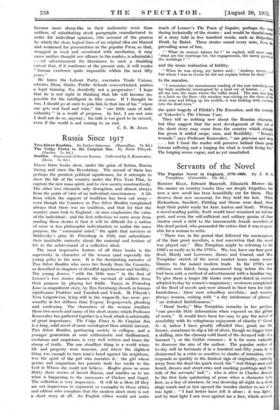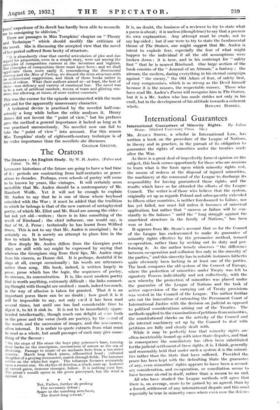Servants of the Novel
ROBERT RAGE, Edward Bancroft, Elizabeth Blower—like the names on country tombs they are deeply forgotten, but now a new scroll has been beautifully cut for them. They deserve their new memorial, for they held the fort. When Richardson, Smollett, Fielding and Sterne were dead, these kept their public ready for Jane Austen and Scott. Without a novel-reading public, Scott would have remained an inferior poet, and even the self-sufficient and solitary genius of Jane Austen owed a debt to the innumerable female novelists of this dead period, who persuaded the critics that it was respect- able for a woman to write.
" There was, in the period that followed the masterpieces of the four great novelists, a real conviction that the novel was played out." Miss Tbmpkins might be referring to the 1930's as easily as to the 1770's. We, too, have our four great dead, Hardy and Lawrence, James and Conrad, and Miss Tompkins' sketch of the novel market bears many resem- blances to the noisier modern trade. In the 1770's new editions were faked, being announced long before the first had been sold, a method of advertisement with a familiar ring. To give them a longer life books were post-dated (a custom adopted to-day by women's magazines) ; reviewers complained of the flood of novels and were abused in their turn for high- handedness ; there were schoolboy novelists ; and women, .always women, writing with " a dry intolerance of phrase," " an irritated fastidiousness."
" Dead books," Miss Tompkins remarks in her preface, "can provide little information when exposed on the gibbet of scorn." It would have been too easy to guy the novel of sensibility with its voluptuous enjoyment of charity (" Great G—d, unless I have greatly offended thee, grant me the luxury, sometimes to slip a bit of silver, though no bigger than a shilling, into the clammy-cold hand of the decayed wife of a baronet "), or the Gothic romance ; it is far more valuable to discover the aim of the author. The popular writer of to-day will be fortunate if in a hundred and fifty years he is disinterred by a critic so sensitive to shades of intention, who responds so quickly to the faintest sign of originality, cutting away from the dead the quick wood, the " real things seen and heard, dresses and street-cries and smoking puddings and the talk of the servants' hall " ; who is alive in Charles Jenner to the first lyric quickening of prose when a character tells how, as a boy of nineteen, he was drowsing all night in a dark stage coach and at last opened the wooden shutter to see if it was light : " I had better have left it alone ; it was light; and by that light I saw over against me a face, which several years' experience of its deceit has hardly been able to reconcile me to consigning to oblivion."
There are passages in Miss Tompkins' chapter on " Theory and Technique " which should modify the criticism of the novel. She is discussing the accepted view that the novel of her period suffered from laxity of structure.
" It is abundantly clear that careful articulation of plot and due regard for proportion, even in a simple story, were not among the principles of composition current in the 'seventies and 'eighties. But principles of composition there must have been ; and we shall appreciate them more easily if, remembering the Sentimental journey and the Man of Feeling, we discard the term structure,with its architectural suggestions, and think of these books rather in terms of colour. What their authors aimed at—at least, the hest of them—was delicacy and variety of emotional hue. The novel was to be a sort of artificial rainbow, woven of tears and glinting sun- shine, but allowing, at times, of more violent contrasts.
This was the excuse for the episode unconnected with the main plot and for the apparently unnecessary character.
A technical device is practised by the novelist half-con- sciously a long while before the critic analyses it. Henry James did not invent the " point of view," but his prefaces
gave the method a general importance it lacked as long as it was practised unconsciously. No novelist now can fail to take the " point of view " into account. For this reason Miss Tompkins' study of eighteenth-century technique is of far wider importance than the novelists she discusses.
GRATIAM GREENE.































 Previous page
Previous page